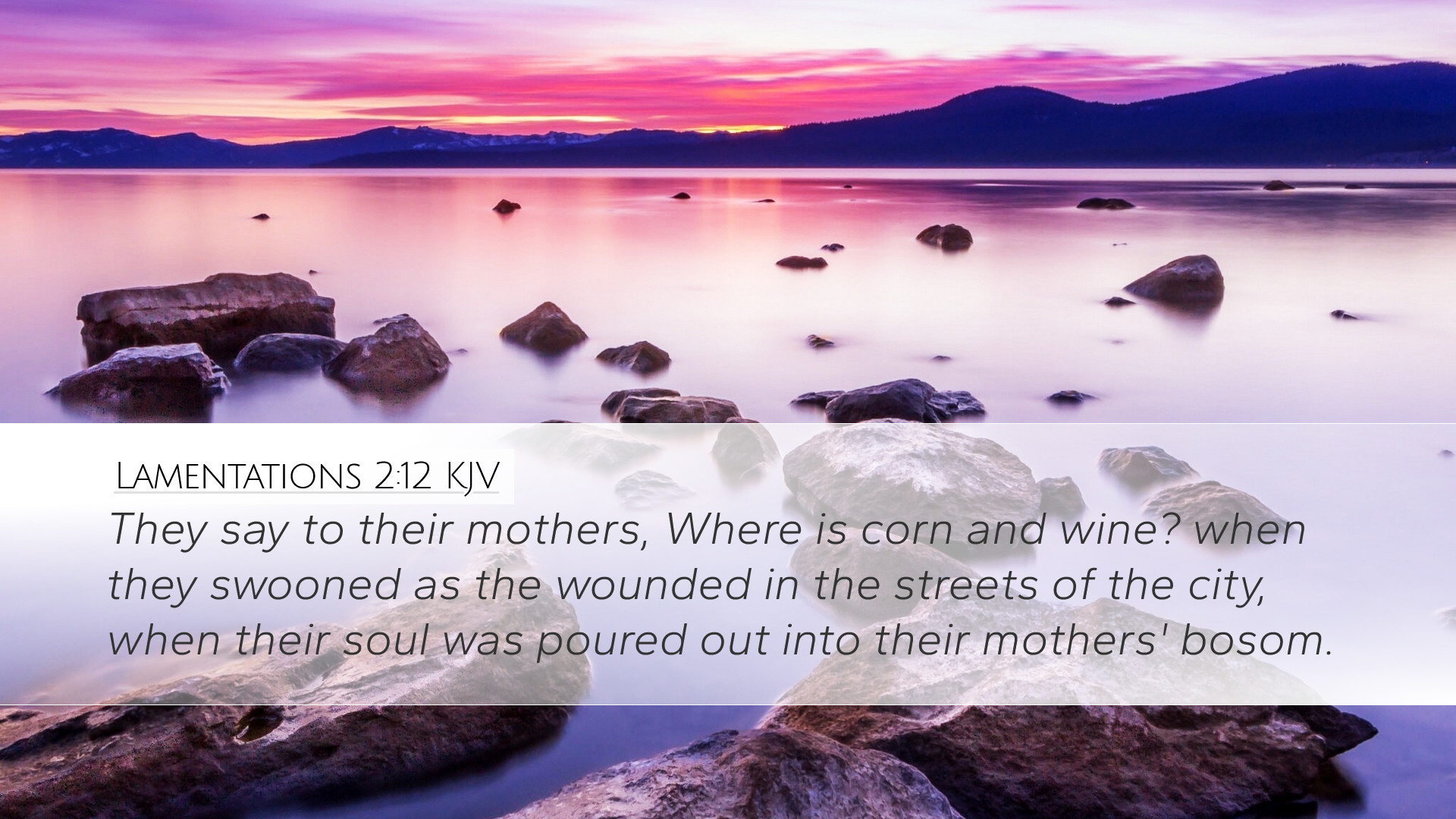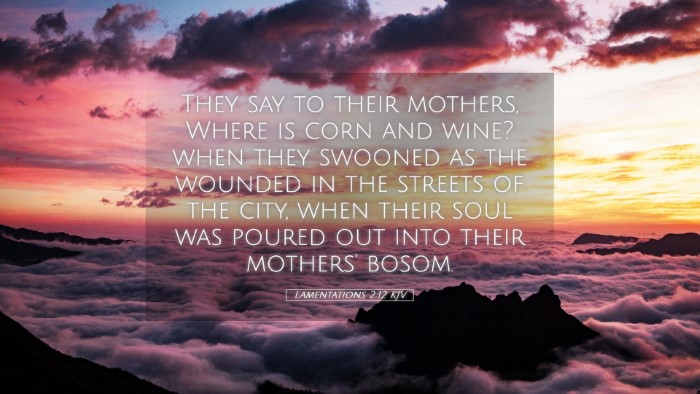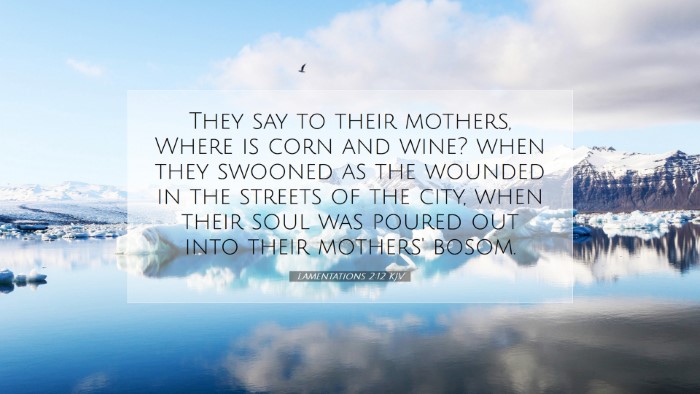Lamentations 2:12 - Commentary Summary
Verse (NASB): "They say to their mothers, 'Where is grain and wine?' As they faint like a wounded man in the streets of the city, as their life is poured out on their mother's bosom."
Contextual Overview
The book of Lamentations, attributed traditionally to the prophet Jeremiah, is a profound expression of grief and sorrow over the destruction of Jerusalem. It is set against the backdrop of the Babylonian siege, which led to exile and devastation for the people of Israel. In chapter 2, the poet mourns the catastrophic consequences of Jerusalem's sins and the ensuing divine judgment.
Commentary Insights
Matthew Henry's Commentary
Henry emphasizes the vivid imagery used in Lamentations 2:12, highlighting how the children of Israel, in their despair, plead with their mothers for basic sustenance—grain and wine. This plea reflects not only their physical hunger but symbolizes deeper spiritual deprivation. The children, seen as innocent victims, express their anguish and helplessness amidst the destruction.
This verse underscores the gravity of their situation. Henry points out that the reference to the "streets of the city" serves to illustrate the public nature of their suffering; it was not just a private misery but a communal plight that affected the entire society. The mention of mothers evokes parental care and the hope that should accompany familial bonds, now turned into a portrayal of desperation and mourning. In doing so, he urges readers to apprehend the intense human suffering and the loss of former prosperity that accompanies the judgment of God.
Albert Barnes' Notes
Barnes delves into the phrasing of the verse, noting that the anguished cries for food reflect the dire circumstances following the siege. Children asking, "Where is grain and wine?" indicates not merely physical hunger but a profound existential crisis within a society that has experienced a monumental collapse.
Barnes illustrates that the act of ‘fainting like a wounded man’ expresses the traumatic effects of siege warfare. The use of the term ‘wounded man’ conveys not only physical pain but also a psychological collapse. The streets, typically filled with vitality and life, now echo the cries of those who are broken and despairing. Their lives being "poured out" upon their mother's bosom symbolizes the tragic loss of youth and potential, highlighting how divine judgment poignantly impacts even the most innocent among them.
Adam Clarke's Commentary
Clarke provides additional insight into the emotional weight borne by the mothers addressed in this verse. He suggests that the mothers themselves are paralyzed by grief, watching their children suffer and die before their eyes, which accentuates the tragedy of familial separation amid national calamity. Clarke points out that this image serves to amplify the themes of mourning and despair that permeate the text.
He points out how the phrase ‘poured out on their mother’s bosom’ speaks to the intimate bond of life and death. Unlike normal cycles of nurturing and growth, the situation has turned into a perverse and tragic reversal where motherhood, typically characterized by care and comfort, is now accompanied by death and mourning. Clarke advocates for an understanding of this passage that sees not only the physical suffering but also the relational and spiritual devastation that sin and its consequences yield.
Theological Implications
This verse serves as a stark reminder that sin has profound repercussions not just on individuals, but on families and entire communities. It challenges theologians and scholars to grapple with the reality of divine justice and its implications for communal life. The imagery of children pleading for sustenance amidst societal collapse speaks to a theological concern for justice and mercy, pushing the reader to consider the nature of God's relationship with His people, especially in times of national crisis.
Pastoral Applications
For pastors and spiritual leaders, Lamentations 2:12 is a poignant text that can be used to address the realities of suffering in their congregations. It serves as a reminder to provide pastoral care to the vulnerable and suffering among them. This text encourages leaders to cultivate compassion and understanding when addressing the spiritual and physical crises of their communities.
- Understanding Suffering: Pastors can draw on this text to teach about the human experience of suffering, emphasizing that it is acknowledged in scripture.
- Community Engagement: Leaders can advocate for community support systems that help provide for those in need, reflecting God's love in action.
- Generating Hope: This passage speaks of a bleak reality, but there is an avenue to highlight the hope that can be found in God even in the deepest despair.
Conclusion
Lamentations 2:12 presents a powerful portrayal of grief, loss, and divine judgment, which compels modern readers, especially those in leadership or academic positions, to revisit the weight of sin and its consequences. The collaborative reflections of Matthew Henry, Albert Barnes, and Adam Clarke provide rich layers of theological and pastoral insights that challenge us to engage compassionately with those who suffer and to seek God's guiding presence amid the storms of life.


